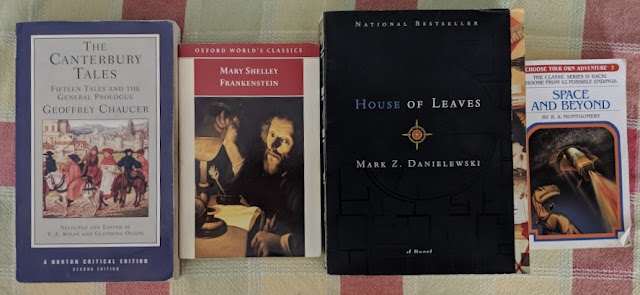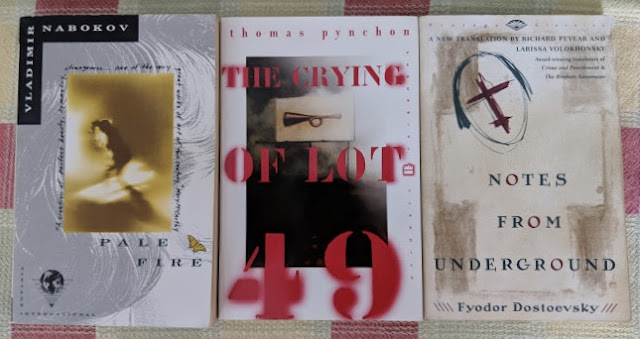Load-Bearing Elements – Metafiction
 |
| Pictured: a selection of metafictional texts. |
Whoa! You can't just jump into the deep end like that!
What'd'ya mean "the deep end?" Metafiction as a concept is neither new nor esoteric.
Well, no, but the name is crazy pretentious. As is any word that begins with "meta-."
What about "metamorphosis?"
Fine! Any jargon from any humanities discipline that uses the "meta-" prefix is crazy pretentious. Just call it a "conceit" or a "framing device."
No, we're sticking with "metafiction." So let's jump in, shall we?
If you insist. What's the deal with metafiction?
Well, while the term "metafiction" may have arisen from Post-Modernism (Wikipedia says it did, anyway), the idea predates the term by centuries. As you pointed out, any work of fiction with a framing narrative is metafiction. Let's look at a few examples.
Yes, let's.
So, let's start with Mary Wollstonecraft Shelley's Frankenstein. Do you know what sort of metafictional device Shelley uses to frame this novel?
You know there's more than one.
Very good. Frankenstein actually comprises multiple nested framing devices. That's right, metafictional narratives within metafictional narratives. Metaception!
You're definitely not blowing anyone's mind, Lucas.
Right. Okay, so we start out with several letters sent from a polar explorer named Walton to his sister back in England. You know, normal stuff about his journey and everything they're going to learn from it. Then he mentions that they found a man out on the ice, dying of exposure. They take him in, and over time he tells Walton the story of how he ended up stranded in the middle of nowhere. A story which Walton has faithfully recorded and enclosed for his sister's edification. Oh, right, the man is Victor Frankenstein.
I know.
So, we've dropped down to level two, where Frankenstein tells the story of how he grew up and got interested in science and figured out the secret to immortality and made a gigantic, beautiful man. That man (henceforth to be called the Creature) terrifies his creator so badly that Frankenstein flees and doesn't think about that time when he created life until the Creature tracks him down and demands that Frankenstein make him a bride. In the meantime, the Creature tells Frankenstein about what happened after he was abandoned.
Level three.
Yep! Within that story, is the story of how the Creature, rejected by the whole of humanity, voyeuristically watches the lives of a family out in the countryside. So in level four, we find a happy domestic drama unfolding. Back on level three, this makes the Creature realize that he wants the happiness he sees in the family. So, on level two, he tells Frankenstein to create a companion for him. Frankenstein begins work on a bride for the Creature before rethinking this course of action and destroying his second creation. The Creature kills Frankenstein's fiancée/foster sister in revenge and vows to pursue him to the ends of the Earth, which how he ends up out on the ice. Which brings us back up to level one, where Walton discovers Frankenstein, hears all of this and writes his sister an unreasonably long letter.
So then the metafiction of Frankenstein is that Walton wrote a letter to his sister about how Victor Frankenstein told him a story about the time that the Creature told Frankenstein the story of how he found out about the story of a happy family out in the countryside.
Yes.
Well that makes it sound a little silly.
There are other metafictions to choose from. Like J.R.R. Tolkien's The Hobbit or Roald Dahl's The BFG which both end with the revelation that the title character decided to write a book about their adventures and that you have just finished reading said book. By the way, I remember reading The BFG as a kid and having my mind blown by that ending.
So would you say that the thing that separates metafiction from a narrative conceit is that a metafictional work makes some sort of excuse for itself or how it came into existence?
That's a good working definition. Metafictional texts also often highlight their own artificiality, either for comedic purposes or to make a point about the nature of creating art or both or neither.
 |
| Pictured: a selection of even more metafictional texts. |
But would you say that that's enough to build an entire story or novel or poem or whatever on?
If it's done well enough, I don't see why not. It won't work for everyone, obvs. But a well crafted metafiction can reinforce themes in the story it surrounds. Let's take another look at Frankenstein for a moment.
I fear we may have exhausted its usefulness as an example.
I'll be brief. So, we have Walton, a polar explorer which, it should be noted was a very dangerous profession. He's risking his own life and the lives of his men for the sake of discovery. Who should he meet but Frankenstein who shares a story of how, in his own pursuit of knowledge, he's unleashed an immortal (?) monstrosity on the world that has murdered several people including Frankenstein's fiancée/foster sister. A cautionary tale about the dangers of scientific curiosity untethered from ethics or responsibility. Speaking of responsibility, that's what the Creature's story is about. Abandoned by his creator (but really father) and rejected by all of humanity, the Creature tells Frankenstein about his vicarious happiness at witnessing the joy of a happy family, something Frankenstein denied him.
Huh, sounds like somebody had daddy issues.
Well that's a little reductive. My point is, the metafictional elements of Frankenstein reinforce its ideas by confronting characters with the consequences of their actions or plans.
Cool.
So do you think we should leave off here?
I think that's good. But, you know, if you wanted to talk about Frankenstein, you could've just said, "Hey! Hypothetical Reader, d'ya wanna talk about Frankenstein?" Spoiler alert: I always wanna talk about Frankenstein.
It's really good, right?
So good.
Links:
I've actually reviewed a metafictional text in this very blog, that's right, it was The Inquisitor's Tale.
 |
| See, here's the picture that ran with the review! |
Comments
Post a Comment